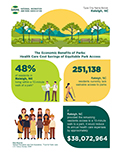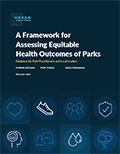Parks provide significant benefits to both the health and well-being of people who use these spaces and the economy.
Data establishes the ways the parks promote greater well-being across four domains of health: physical, mental, social and environmental. Greater physical activity, access to green spaces, and services and programming that promote better health outcomes lead to less reliance on medication, fewer trips to the hospital, and lower healthcare costs.
Data also shows the vast range of economic benefits that parks provide. Local park and recreation agency operating and capital expenditures across the United States generated $218 billion in economic activity and supported nearly 1.3 million jobs in 2019. This is only one facet of parks and recreation’s economic impact, which also includes environmental benefits, business development, tourism and higher property values (and a larger tax base).
With this in mind, NRPA supported the Urban Institute to develop resources that help park and recreation professionals and advocates make a health-based case for parks, including measures of the economic value to those health benefits. Resources include an annual health care cost benefit of equitable access to parks estimator, a communications guide to help convey the impact, a literature review and a framework that demonstrates how public data establishes the ways parks promote greater well-being.

This annual health care cost benefit of equitable access to parks estimator helps park and recreation professionals and advocates demonstrate the economic benefits resulting in increased health outcomes that come from eliminating inequitable park access. Using a combination of publicly available data and a straight-forward methodology, a user will be able to estimate annual health benefits in dollar should a city or town ensures every community member lives within walkable distance of a park or other public open space. These data are part of the powerful case for greater and more sustainable park and recreation funding.
Access The Calculator
To leverage the information from the estimator, use this communication guide to help craft your story and messages for a variety of audiences. Share the impact of the health and economic impact of parks and garner support to advance your efforts in creating healthy and resilient communities.
Access the Guide

The comprehensive framework demonstrates the ways parks promote greater well-being and provides guidance on how to communicate the economic value resulting from these benefits. It provides five steps for assessing these benefits: 1) Identify park characteristic, 2) Examine who has access, 3) Select and measure health outcomes, 4) Estimate economic benefits, and 5) Drive equity through action steps. Use the framework to demonstrate the health contributions of park systems quantitively and qualitatively.
Read the report
The report is a summary of research findings that show a linkage between parks and recreation and better health and well-being outcomes. The Urban Institute team canvassed a wide variety of research resources, including studies by either NRPA or the Urban Institute, academic journal research studies, case studies, practitioner reports, and guidance documents and toolkits. In all, the researchers drew from more than 100 reference documents that paint how parks and recreation lead to healthier communities.
Read The Report
Read More
- “A Framework for Assessing Equitable Health Outcomes of Parks,” Parks & Recreation magazine, January 2023
- “4 Dimensions of Health in Parks and Recreation,” NRPA blog, December 27, 2022
- “5 Steps to Assessing Equitable Health Outcomes of Parks,” NRPA blog, December 15, 2022
- “A Framework for Assessing Equitable Health Outcomes of Parks,” NRPA blog, December 5, 2022
- “Studying the Health Benefits and Economic Impacts of Parks,” Parks & Recreation magazine, April 2022
Additional NRPA Resources


